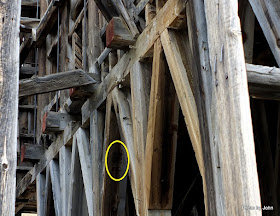It was a bit surprising to see For Sale signs on some of the old mine properties, although I will admit that this one had a modern cabin perched on the hillside above the mill remains in the previous picture.
Frisco Mill was the primary destination for the day. To reach it, you continue past Animas Forks. The mill had three levels. The lowest level was in the worst condition because in the 1980's people stole the weathered siding off of that section.
Before spending time at the mill, I wanted to see if I could get to the Placer Gulch intersection with my 2wd truck. The answer was yes, and I got a chance to do a bit of hiking around the area before heading back down the hill.
The mill doesn't look as big from the uphill side!
This is another private property that sports a For Sale sign. The sale includes the 7500' Bagley Tunnel. This picture clearly demonstrates what happened to this structures during WWII. The buildings were built around the ore processing equipment so during the wartime scrap drives, holes were busted in the buildings to extract the heavy mill equipment. This building has a beam installed to replace the structural member removed at that time.
The link goes to an application for listing as a historic property. It's really interesting reading.
The building structure used mostly 8x8, 10x10, and 12x12 inch sawn timbers. Each joint was notched and shaped, then through bolted. The prefab process was accurate enough that none of the joints needed to be reworked when it was assembled on site.
The other reason this mill is famous is because it was built much flatter than most mills. It was all electric, and used bucket lifts to move the ore to the next process. At the left edge of this photo is one of the remaining 12' diameter settling tanks, and some structural fixes that were installed in the past 20 years.
By the time I left the Frisco Mill, clouds were starting to build in the valley below. I wanted to include an Animas Forks visit while I was in the neighborhood, but...










Love that last photo....glad you are getting to spend time in the mountains. We are trying not to be jealous.
ReplyDeleteAnd I'm doing my best to not get jealous about that trailer of yours... The minute I spotted that old International, I knew I needed pictures of it - There's a long family history with an International K-6.
DeleteGreat post. Loved reading the history in the application. Really surprised the structure hasn't been sold for recycled lumber. Timbers of that age and size draw a premium price.
ReplyDeleteI was amazed with the application. Great detail that you would normally never see. I must admit, I was looking at those timbers jealously. Resawn for floors & trim work, they'd be worth a fortune!
Delete